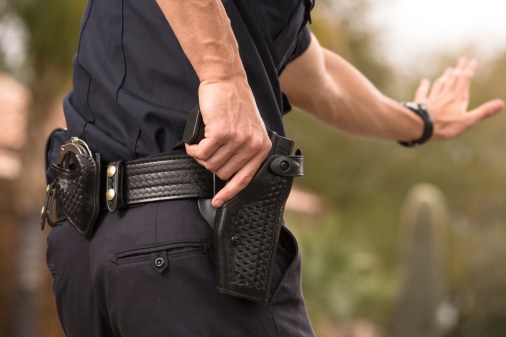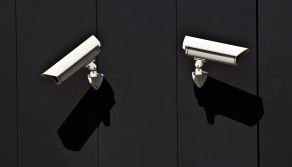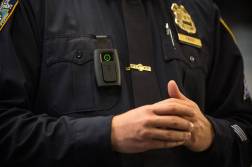Boston strikes deal with police union to move ahead with body camera pilot

Following a series of delays, Boston is now ready to move forward with a police body camera pilot program after hammering out an agreement with its police union.
Mayor Martin Walsh and Police Commissioner William Evans announced the deal with the Boston Police Patrolmen’s Association Tuesday, sketching out a few more details for how the voluntary pilot to test the technology will work.
“The BPPA believes that a pilot program will enable the department and the union to evaluate whether body cameras contribute to officer safety, provide useful evidence for criminal prosecutions and help to foster positive relations with the citizens of and visitors to the city of Boston,” Union President Patrick Rose said in a statement.
Namely, the agreement calls for the department to equip “up to 100 officers” with body cameras for six months, as supported by $500,000 set aside for the program in the city’s budget for the coming fiscal year. Officers will have to volunteer to join the program, and they’ll receive $500 from the city if they participate in it through its completion.
Once the pilot ends, the city and department will have the option of continuing to use the cameras, but that would require another round of negotiations with the union to draw up a new agreement governing their use.
However, in a release, the city also noted that the “start date of the pilot program, along with other specific policies related to body cameras, are in the process of being finalized.”
In the days before the release of the agreement, civil rights advocates blasted the department for consistently delaying the pilot program after Evans announced its creation last September. The commissioner told the public radio station WGBH Tuesday that he hopes to have the pilot off the ground by August before extending it permanently in some form, but many are still skeptical.
“We appreciate this step forward by both the city of Boston and the Boston Police Patrolmen’s Association in advancing a long overdue body-camera pilot,” Michael Curry, Boston NAACP president, said in a statement. “However, we are still concerned that too many sound conflicted over its usefulness and benefit to both law enforcement and citizens. The data is clear, and communities are demanding this level of transparency going forward. We’re now asking the city of Boston to move with a sense of urgency toward full adoption by 2018.”
[Read more: Boston police body camera program stalls, raising questions about other Mass. efforts]
Several civil rights groups also expressed reservations about some of the policies the city will use to govern the pilot project. Specifically, the union won the right for officers to view camera footage before giving a statement about a police shooting, a practice widely condemned by accountability advocates.
“This encouragement can make it impossible for anyone to know what the officer actually saw — as opposed to what the camera saw — and can even enable officers to change their version of events based on what was or wasn’t captured on camera,” Matthew Segal, legal director of the American Civil Liberties Union of Massachusetts, said in a statement. “Officers should be permitted to review the video only after writing their initial reports, just as civilians are typically not permitted to view video before being interviewed by the police.”
Segun Idowu, co-founder of the Boston Police Camera Action Team, also noted that his organization remains opposed to the voluntary nature of the program.
“What I know will happen because of how things work in Boston is that the officers that will participate will be the great officers, the one who do a great job,” Idowu told StateScoop. “That’s not what they’re for. The good work that officers do should be commended, but these cameras are meant to ensure that people on both sides of the camera are acting in a proper manner and that things don’t escalate as we’ve seen them escalate around the country.”
Idowu’s group, the ACLU and NAACP also find fault with the department’s decision to give officers broad discretion to turn their cameras off.
The city has yet to release the policy officially, but a version obtained by the Boston Globe indicates that officers have the authority to deactivate cameras when the situation they’d be recording is “of a sensitive nature.” The policy doesn’t precisely categorize what could be included under that broad umbrella, noting that locations like “locker rooms, places of worship, religious ceremonies, certain places in hospitals or clinics, law officer, day care facilities, etc.” could all be places where officers would consider turning off their cameras.
However, the civil rights groups did praise the department for considering the sensitivity of recording in a person’s home in the policy. They also supported the city’s decision to prohibit officers from starting a recording “based solely upon the civilian’s political or religious beliefs or upon the exercise of the civilians’ First Amendment rights,” and to refrain from using biometric technologies (like facial recognition software) in conjunction with the cameras.
“There is truly a lot to like in this pilot policy,” Segal said. “The touchstone here, as in all aspects of body-camera programs, is ensuring police accountability and public trust.”






